Last Updated: 29/12/2025
Kitten Vaccination Schedule: the Ultimate Guide for Australian Pet Parents
Welcoming a new kitten? Ensuring they stay healthy starts with the right shots. Discover the core Australian vaccination schedule, understand maternal antibodies, and learn how your vet keeps your playful friend protected against "cat flu" and more.
Author: Dr Brittany Ward BVSc
Reading Time: 13 minutes - short read
Bringing a tiny, purring ball of fluff into your home is one of the most joyful experiences you can have. However, those early months are also when your kitten is most vulnerable to illness. Their little immune systems are still learning the ropes, which is why a structured vaccination plan is so important. Think of it as an essential health shield that guards them against serious, and sometimes fatal, diseases while they grow. By following a clear schedule, you’re not just ticking a box - you’re giving your kitten the freedom to grow, play, and explore their new world safely.
In this article
- Why kitten vaccinations are essential
- Understanding the Australian kitten vaccination schedule
- Core vs non-core: what vaccinations does your kitten really need?
- The science of maternal antibodies and booster shots
- When are non-core vaccinations recommended for outdoor cats?
- What to expect during your kitten's vet consultation
- Beyond the first year: adult cat booster vaccinations
- Common vaccination concerns and side effects explained
- Do indoor cats really need to be vaccinated?
- FAQs
Why kitten vaccinations are essential
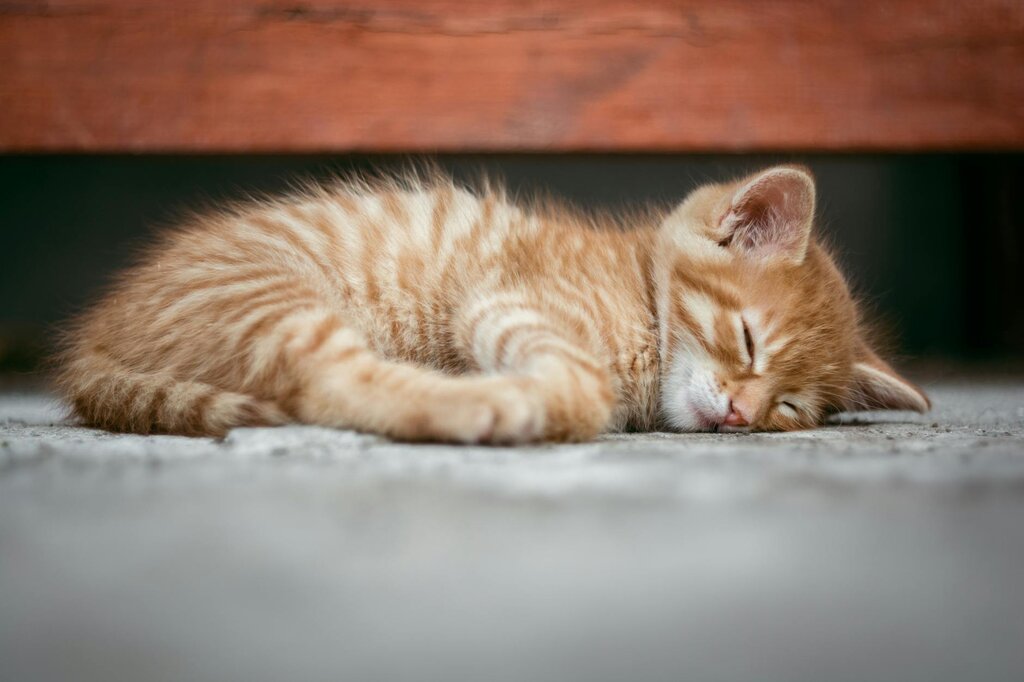
Vaccinations are the most effective way to protect kittens from life-threatening diseases. Because their immune systems are still developing, kittens are especially vulnerable to infections that an adult cat might handle more easily.
Diseases prevented by core vaccinations
The standard kitten vaccination course (the F3) targets three primary threats:
Feline Calicivirus and Feline Herpesvirus-1: These are common causes of "cat flu". Symptoms often start with sneezing, nasal congestion, and runny eyes, but can progress to:
- Painful mouth ulcers
- High fever and lethargy
- Loss of appetite
Feline Panleukopaenia (Feline Parvovirus): This is a severe, highly contagious disease that attacks rapidly dividing cells, such as those in the bone marrow and gut. It can cause:
- Severe vomiting and bloody diarrhoea
- A weakened immune system
- Sudden death, especially in young kittens
How vaccinations work
A vaccine introduces a tiny, harmless version of a virus to your kitten's body. This "teaches" their immune system how to recognise and fight the virus without actually making them sick. If they encounter the real disease later in life, their body is already prepared to jump into action, either preventing the illness entirely or making the symptoms much milder.
The benefit to the community
Vaccinating your kitten doesn't just protect your own pet; it helps the wider cat population through "herd immunity."
- Reducing spread: When at least 70% of cats are vaccinated, the disease has fewer places to hide and spread.
- Protecting the vulnerable: This community-wide protection shields cats that cannot be vaccinated, such as those with autoimmune conditions or tiny kittens who are still too young for their first needles.
- Human safety: In many parts of the world, vaccinating pets for diseases like Rabies is also a critical step in keeping people safe from zoonotic diseases.
Understanding the Australian kitten vaccination schedule
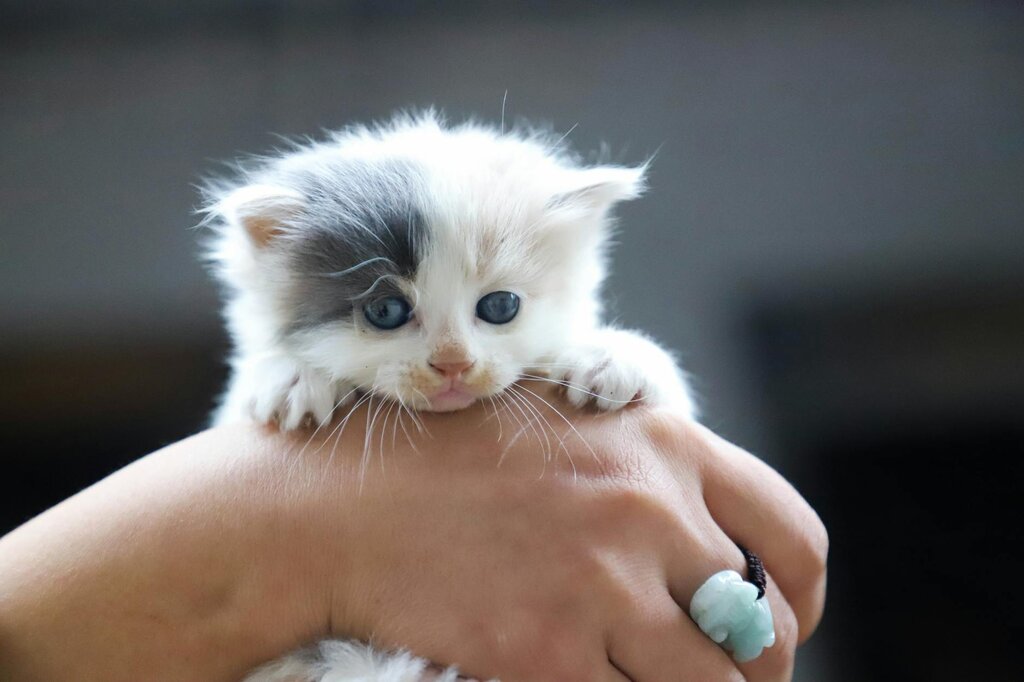
Your kitten will typically require a course of 3 vaccinations at the following ages:
- 6-8 weeks
- 10-12 weeks
- 16 weeks or older
Kittens under 6 weeks of age are protected by maternal antibodies. We know that in most kittens maternal protection wanes between 6-16 weeks of age, but cannot determine exactly when this will be in the individual kitten. In order to ensure kittens are protected, the World Small Animal Veterinary Association recommends vaccinating every 2-4 weeks from 6 weeks of age until 16 weeks or older.
Core vs non-core: what vaccinations does your kitten really need?
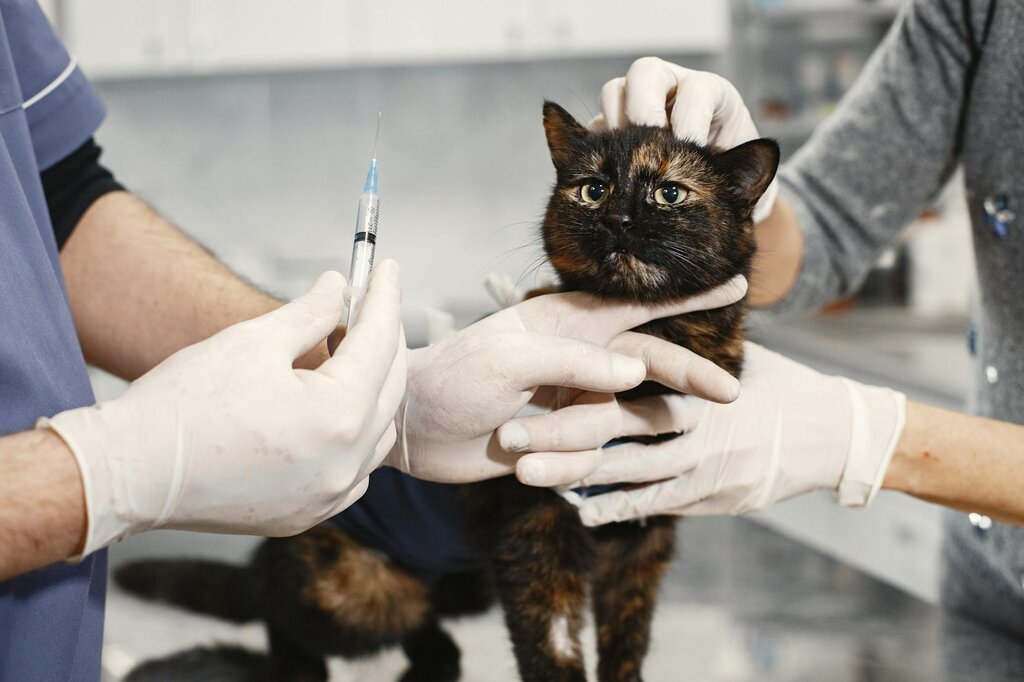
There are three different categories of vaccinations that your cat may be able to receive: Core Vaccinations, Non-Core Vaccinations and Not Recommended. The available vaccinations in each species and country are divided into these three categories depending on how important they are.
Core Vaccinations
Core vaccinations are those that all cats are required to receive irrespective of circumstances or location. These are essential vaccinations that are chosen because they protect cats against severe, life-threatening diseases that are present globally.
There are 3 core vaccinations for cats:
- Feline Panleukopaenia (FPV) OR Feline Parvovirus
- Feline Calicivirus (FCV)
- Feline Herpesvirus-1 (FHV-1) OR Feline Rhinotracheitis Virus
These core vaccinations are combined and administered in a single injection called an F3 Vaccination. The core vaccination is what your kitten will be administered with at their kitten vaccinations.
Rabies vaccination is considered a core vaccination in countries where it is regularly occurring. It is not a core vaccination in Australia, rather it is 'not recommended'. If your kitten, or cat, is moving overseas, you will need to check that country's core vaccination requirements.
Non-Core Vaccinations
Non-core vaccinations are those that are required by cats whose location, environment and lifestyle put them at an increased risk of the disease. These vaccinations are optional, but your vet may recommend them for your cat if they are at risk.
The non-core vaccinations available in Australia are:
- Feline Leukaemia Virus (FeLV)
- Feline Immunodeficiency Virus (FIV)
- Chlamydia felis
If your kitten receives an F4 Vaccination, it will usually involve two vaccinations and one of the above Non-Core Vaccinations will be included with the F3 Core Vaccines. An F5 Vaccination includes both FeLV and FIV.
'Not Recommended' Vaccinations
Vaccines considered 'Not Recommended' are those that are not present in your local area and your kitten is not at risk of. The aim is to provide as few vaccinations as is required, so these vaccinations would be given unnecessarily. As mentioned above, Rabies vaccination is not recommended in Australia as we do not have Rabies in our country.
The science of maternal antibodies and booster shots
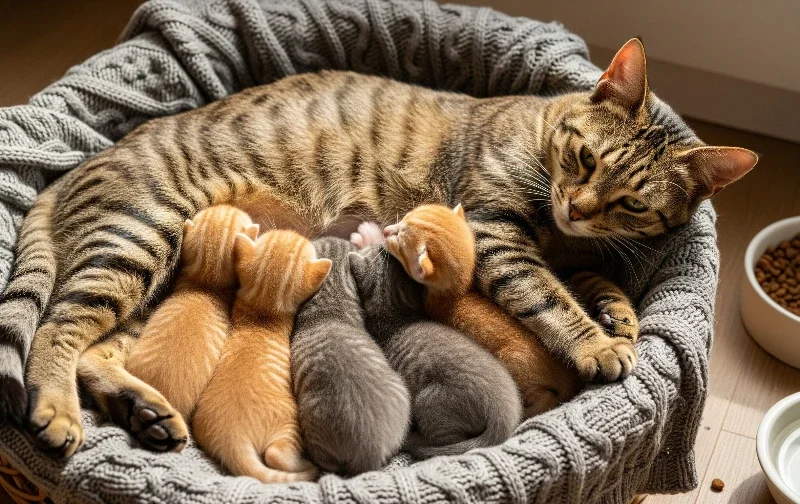
Understanding maternal antibodies
Most kittens are born with a natural "starter kit" of protection, but understanding how this wears off is key to timing their vaccinations correctly.
What are maternal antibodies?
When a mother cat (the queen) is vaccinated, or naturally infected with a virus, she develops antibodies - special proteins that recognise and fight off specific viruses. She passes this immunity on to her kittens:
- In the womb: Some protection is transferred before birth.
- Via milk: The most significant boost comes from the first milk, known as colostrum.
These antibodies circulate in the kitten's blood, protecting them from disease during their first few weeks of life.
The "gap" in protection
While maternal antibodies are great for newborns, they create a unique challenge for vaccinations:
- Waning immunity: These natural antibodies don't last forever. They usually begin to fade around 6 weeks of age, leaving the kitten vulnerable.
- Vaccine interference: If maternal antibodies are still high, they can actually "neutralise" a vaccine, preventing the kitten's own immune system from learning how to protect itself.
- The 20-week window: While most maternal protection is gone by 12 weeks, some kittens keep these antibodies for up to 20 weeks.
Why the three-dose schedule is necessary
Because every kitten is different, there is no way to know exactly when the mother's protection ends without an expensive blood test called a titre test. To ensure every kitten is safe, a series of shots is the most reliable method:
- The strategy: Administering vaccines every 2–4 weeks (usually at 8, 12, and 16 weeks) ensures that as soon as the maternal antibodies drop, the vaccine can step in and provide long-term immunity.
- Closing the window: This frequent schedule minimises the time your kitten spends without any protection at all.
- Individual needs: Some kittens, especially those in high-risk environments or those who started their course very early, may require additional boosters as advised by a veterinarian.
When are non-core vaccinations recommended for outdoor cats?
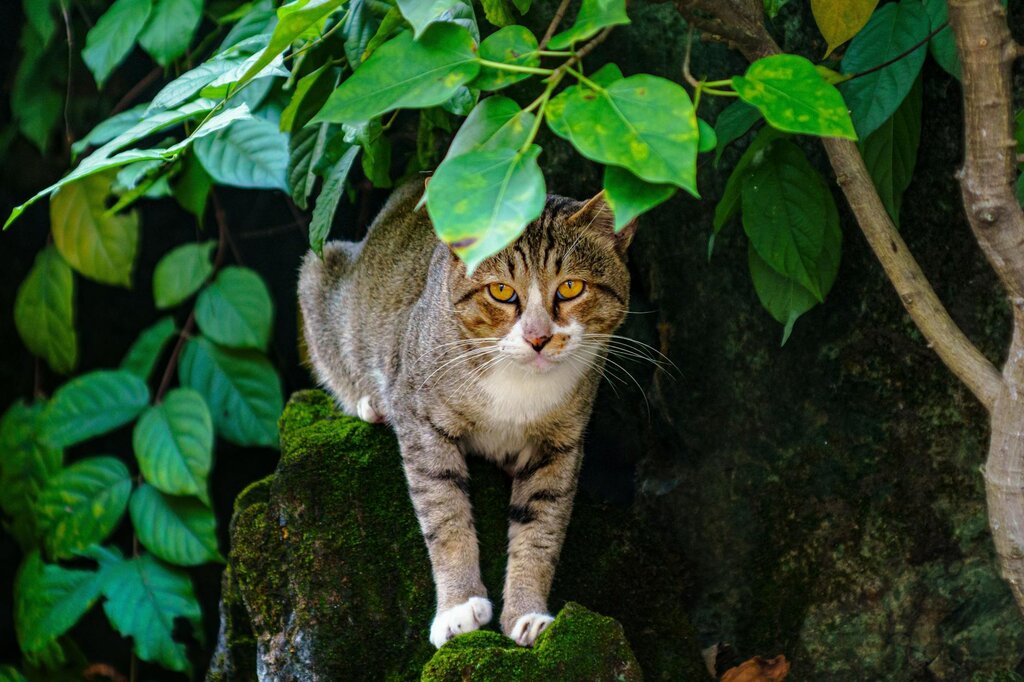
As mentioned above, non-core vaccinations are those that are only required by cats who are at increased risk of the disease. So how do you know if your kitten is at risk?
Feline Leukaemia Virus (FeLV) vaccination is recommended in kittens less than 1 year old with outdoor access, or exposure to other cats (particularly outdoor cats), in any area where the disease is prevalent. Check with your regular vet if you are living in an area of high prevalence. Any kittens negative for FeLV can be vaccinated with two doses 2-4 weeks apart.
Feline Immunodeficiency Virus (FIV) is transmitted by cat bites. This means outdoor cats and cats in multicat households are most at risk. Cats in areas when FIV is of high prevalence, with outdoor access, should be considered for vaccination. Chat to your vet about prevalence in your local area.
Chlamydia felis vaccination is usually recommended for cats with outdoor access and exposure to other cats. This disease is treatable and non-life threatening, so not all vets will recommend this vaccination.
Learn more in our article all about Feline Immunodeficiency Virus.
What to expect during your kitten's vet consultation
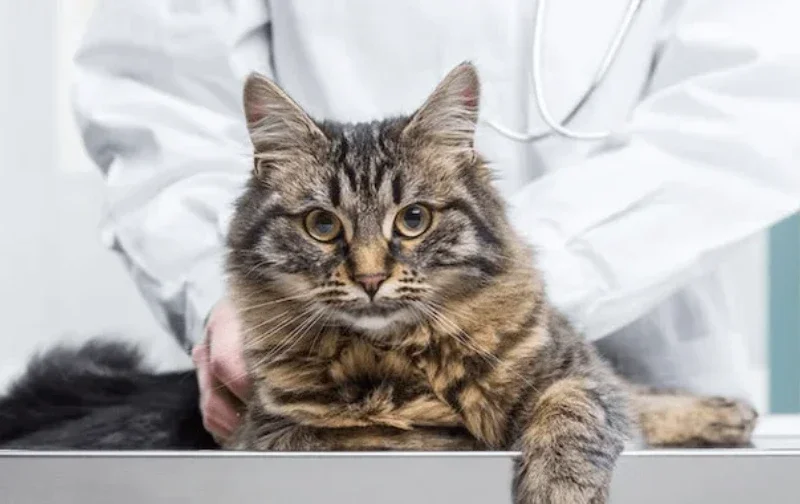
A vaccination visit is much more than just a quick needle. It is a comprehensive health check where your vet ensures your kitten is in peak condition to receive their protection.
The pre-vaccination health check
Before any vaccine is administered, your vet will perform a thorough physical examination. This includes:
- Checking vitals: Taking your kitten's temperature and listening to their heart and lungs.
- Assessing health status: Ensuring your kitten isn't currently fighting an underlying illness.
- Reviewing history: Asking you about their appetite, energy levels, and any changes you've noticed at home.
Why only healthy kittens are vaccinated
It is vital that a kitten is 100% healthy before getting their shots. If a kitten is unwell, a vaccination can be problematic because:
- Reduced effectiveness: The immune system is already busy fighting an illness, meaning it won't respond as well to the vaccine, potentially making the shot ineffective.
- Worsening symptoms: Diverting the body's resources to respond to a vaccine may make it harder for the kitten to recover from their current sickness.
- Increased reaction risk: An already overactive immune system is more likely to have an adverse or anaphylactic reaction to the injection.
A holistic approach to kitten care
Beyond the needle, your vet uses this time to partner with you on all aspects of kitten care including:
- Parasite prevention: Tailoring a plan for fleas, ticks, and worms.
- Nutrition: Recommending a high-quality, age-appropriate diet to fuel their growth.
- Future planning: Discussing the best timing for desexing and microchipping.
- Behaviour and training: Offering tips for common kitten quirks like biting, scratching or litter box training.
Creating a tailored vaccination plan
Every kitten's life is different, so your vet will customise a schedule based on their specific needs:
- Lifestyle assessment: Determining if they need "non-core" vaccines (like FIV or FeLV) based on whether they will be going outdoors.
- Risk factors: Adjusting the frequency of shots - for example, high-risk kittens may need boosters every two weeks.
- Medical suitability: Identifying kittens with specific conditions, such as autoimmune issues, who may require a modified approach to immunisation.
Beyond the first year: adult cat booster vaccinations
To protect any kittens that may have still had maternal antibodies by the final vaccination at 16-20 weeks, a 12 month booster vaccination is recommended, unless otherwise advised by your vet. After which, a booster vaccination will be given every 12 months.
Common vaccination concerns and side effects explained
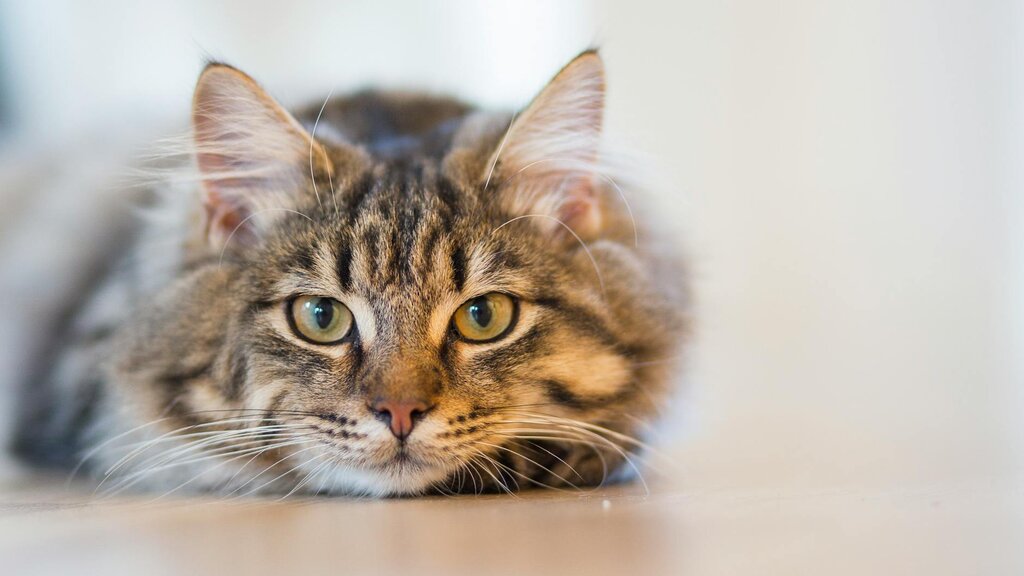
Are vaccinations safe?
Yes, for the majority of cats and kittens, these vaccinations are safe. Products such as these must undergo extensive testing prior to being licensed in order to note common side effects and ensure the vaccine is safe for the majority of cats.
Adverse Reactions
Like any vaccination or treatment, the potential for adverse reactions can occur, however, adverse reactions are rare. It is recommended that Veterinarians report all adverse events and studies have shown that approximately only 0.52% of cats (52 in 10,000) experience side effects from the vaccination.
Most common (due to activation of the immune system):
- Lethargy
- Slight fever
- Mild discomfort
These signs usually resolve within 1-2 days and often considered normal.
- Localised swelling - localised to injection site, may be tender and disappears quickly. Shouldn't have signs of inflammation like growth, discharge or heat
- Cold-like symptoms - this includes sneezing, coughing and a runny nose
- Inappetence - usually only lasts 24 hours
More serious side effects that would warrant a vet visit include:
- Vomiting
- Diarrhoea
- Facial Swelling
- Hives
- Facial or body itching
- Breathing difficulties
These side effects will resolve with treatment by your veterinarian. Adverse reactions are more common in kittens than adults.
FAQs
Setting up your kitten's vaccination schedule is one of the kindest things you can do for your new best friend. While the needles might seem a bit scary, the protection they provide lasts a lifetime. Remember, your local vet is your best partner in this journey, so don't hesitate to chat with them about a plan that suits your kitten's specific lifestyle.
Articles recommended for you
Bringing home a new kitten is exciting, but can feel overwhelming! Our complete guide has everything a new parent needs to know.
We've put together a list of the top 10 frequently asked questions that pet parents ask to help you get all the answers you need in one place!
Is your kitten chewing everything in sight? From the teething timeline to soothing home remedies, discover how to support your kitten through this milestone. Learn when to consult a vet and how to transition into a lifelong dental care routine.
Learn how to care for your kitten’s teeth, from teething milestones to brushing, diet, and vet checks. Discover tips to prevent plaque, keep gums healthy, and support lifelong oral health for a happy, healthy cat.
Having a new kitten is a fun and exciting experience! Now that you've got all your kitten's essential items find out how much to feed your growing kitten
Does your pet suffer from anxiety? Check out our Vet-guide for treatment options to help your pet.
History
Our experts continually monitor the health and wellness space and we update our articles when new information becomes available.
Tue 30 Dec 2025
Edited by Dr Gillian Hill BVSc (Hons)Dr Brittany Ward BVSc
Veterinarian
Dr. Brittany graduated from James Cook University in 2019 with a Bachelor of Veterinary Science and started working in her home town in the Wide Bay-Burnett Region. She has always been excited about working in the veterinary industry, but over the last few years has grown especially fond of dog behaviour and training, surgery and orthopaedic disease.

